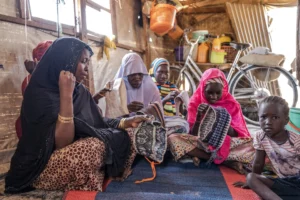On the International Day for the Elimination of Sexual Violence in Conflict, UNODC sat down with Ms. Nkiruka Jones-Nebo, the Deputy Director of Public Prosecution and Head of the Complex Casework Group (CCG) in the Department of Public Prosecution, Federal Ministry of Justice of Nigeria.
Ms. Jones-Nebo was appointed the first Head of the CCG, a specialized unit of the Department of Public Prosecution (DPP) established with the objective of advising on, reviewing, and prosecuting terrorism and other complex cases.
UNODC: Pramila Patten, the United Nations Secretary-General’s Special Representative on Sexual Violence in Conflict, stated that “prosecution is critical, and a form of prevention, as it can help turn the culture of impunity for these crimes (conflict related sexual violence), towards a culture of deterrence”. Can you tell us more about the work being conducted by the Complex Case Group role to ensure that terrorist suspects responsible for acts of sexual violence are held to account ?
Nigeria has an obligation under international law to investigate and prosecute acts of sexual violence in conflict situations. However, conflict-related sexual violence (CRSV) largely remains underreported and consequently, under-investigated and prosecuted.
It is instructive to note that sexual and gender-based violence (SGBV) offences are generally offences triable in state courts – as opposed to federal offences which the CCG is empowered to prosecute. Since the relevant terrorism laws are federal laws, they do not expressly define or criminalize CRSV as an act of terrorism. However, the CCG has been using innovative ways to circumvent these complexities to bring perpetrators to justice. The CCG has achieved this through in-house mentoring and other capacity strengthening activities from our partners, including UNODC and Wayamo Foundation.
I will use the example of the case of the Federal Republic of Nigeria vs. Umar Suleiman. In this case, the defendant, Umar Suleiman, was charged on six counts, including the kidnapping of a Chibok girl. As kidnapping falls within the definition of an act of terrorism in Nigerian law, the defendant was charged with being an accessory to a kidnapping, by forcibly marrying the Chibok girl whom he knew to have been kidnapped. So here, you can see how the CCG was able to link the act of CRSV (forced marriage) to the kidnapping, to create grounds for the prosecution of the perpetrator.
In addition to its prosecutorial mandate, the CCG continues to render legal expertise to investigators of the Joint Investigation Centre in Giwa Barracks, Maiduguri, which also involves advising investigators on what to look out for in terms of evidence to support the prosecution of CRSV.
UNODC: Over the years, Nigeria has recorded improvements in the reporting of sexual violence, although statistics indicate that the level of reporting remains relatively low. What do you think entities within the criminal justice system can do to encourage improved levels of reporting?
Ensuring access to justice is crucial to encouraging improved levels of reporting, [as is] increased awareness of the justice system and its processes. Lastly, proactive gender-responsive and community policing will draw law enforcement personnel closer to the people, which would likely result in survivors and witnesses having more confidence in the system and a greater willingness to report sexual violence crimes without fear.
UNODC: Sexual and gender-based violence cases are particularly sensitive because they require that the well-being of the survivor be considered at every stage of the criminal justice process. How does the Complex Case Group adopt a survivor-centred approach when handling terrorism cases including elements of sexual violence?
For sexual offences, prosecutors must be competent and possess the necessary skills to determine the right charges to bring against the suspects, interview witnesses and survivors, and effectively handle such sensitive cases.
At the CCG, we are diligent about observing relevant laws and principles underpinning a survivor-centred approach, like confidentiality, safety, and privacy. For example, the Constitution of the Federal Republic of Nigeria, as amended, provides for measures to protect the safety and confidentiality of survivors during court proceedings. These measures are also reinforced by the Administration of Criminal Justice Act, 2015, which provides for extra protective measures for SGBV cases. This includes not holding such trials in open courts and not disclosing the names, addresses, and identities of survivors in any record or report of the court.
UNODC: Outside of prosecution, in your opinion, what steps can Nigeria take to reinforce the prevention of conflict related sexual violence?
The effective prevention and countering of terrorism is central to the prevention of CRSV. One of the ways through which Nigeria could reinforce the prevention of CRSV is the general protection of human rights for all, and the observance of the rule of law, through effective law enforcement and military practices. This is essential to preventing conflict and by extension the commission of CRSV.
More can be done in terms of promoting sustainable community-based awareness raising platforms, geared towards creating resilient environments to prevent armed conflict and related sexual violence. Resilient communities can also be fostered through the provision of basic infrastructure and amenities (particularly in rural areas), skills acquisition programmes for youth, and job creation to provide people with living wages.
